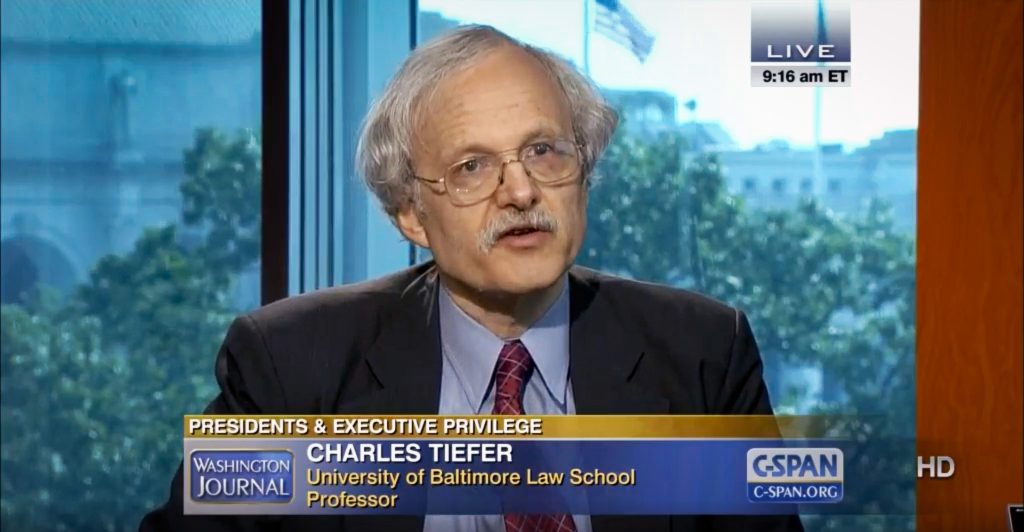By amy e. sloan

If I had to describe Professor Emeritus Charles Tiefer in one word … I couldn’t do it! In his many years at the University of Baltimore School of Law, Professor Tiefer has been a scholar, public servant, teacher, mentor and friend. It would be impossible to reduce his contributions to our community to a single word.
Professor Tiefer began teaching at the law school in 1995. Over the course of his career, he produced an impressive body of scholarship. He has written books, law review articles, and dozens of articles in the popular press and on Forbes.com.
His Congressional Practice and Procedure book is the definitive work on Congressional procedure. His other books include The Polarized Congress: The Post-Traditional Procedure of Its Current Struggles (University Press of America, 2016); Government Contracting Law in the 21st Century (Carolina Academic Press, 2012); and The Semi-Sovereign Presidency: The Bush Administration’s Strategy for Governing Without Congress (Westview Press, 1994).
His articles have appeared in prestigious journals such as Harvard Journal on Legislation, Yale Journal on Human Rights Law and Development, Stanford Journal of International Law, and Cornell Journal of Law and Public Policy, to name just a few.
His many posts on Forbes.com have received hundreds of thousands of views. Receiving 10,000 views was just a regular day at the office for him. One post on Hillary Clinton’s emails received over 250,000 views. Consequently, in 2018 he was recognized with the faculty scholarship award for Excellence in Public Discourse.
His work extended beyond the academy. Throughout his career he has been a dedicated public servant. Before he became a law professor, he was acting general counsel and solicitor and deputy general counsel to the U.S. House of Representatives. After he joined the law faculty, he continued his public service. He provided testimony to Congress on a wide range of issues. From 2008-2011, he served as a commissioner on the congressionally chartered federal Commission on Wartime Contracting in Iraq and Afghanistan. He took a lead role in two dozen televised hearings, and he went on official missions to Iraq and Afghanistan concerning wartime procurement.
Professor Tiefer has also been a devoted classroom teacher. He taught Contracts I and II, Government Contracts Seminar, Legislation, and Secured Transactions. Numerous students expressed appreciation over the years for his clear explanations of the law. (They were somewhat less enthusiastic about his infamous multiple-multiple-choice questions that required figuring out two right answers instead of just one!)
More recently, during the COVID19 pandemic, he devoted many hours to preparing PowerPoint slides to transition his teaching from the in-person classroom to Zoom. Teaching effectively online was a challenge for many law professors, but Professor Tiefer was more than equal to the task. His students so appreciated his efforts that they created a video tribute that they presented to him at the end of one semester.
This long list of accomplishments does not fully capture what Professor Tiefer has meant to the UBalt Law community. He is more than a scholar, public servant, and teacher. He has been a mentor and a friend.
When I was assigned to teach Contracts for the first time, Professor Tiefer took the initiative to reach out to me about the course. He generously shared all of his teaching materials, everything from notes to old exams to supplementary materials. He patiently answered my many questions. Over subsequent semesters, we became teaching partners, sharing materials, hypotheticals, and entertaining stories. (And for those who may be wondering, yes, contract law can be entertaining, like the case that addressed whether an emoji can manifest acceptance.) Professor Barbara White had a similar experience when she began teaching Secured Transactions.
These examples typify the ways Professor Tiefer supported his colleagues. He would send notes of appreciation when someone helped him with a task. He made a point of seeking people out for lunch or coffee to talk about politics, scholarship, teaching, and life. And when those conversations inspired him, as they often did, he would jot down notes in a small notebook he carried in his shirt pocket so he would be sure to remember the ideas.
In the spring, the faculty voted to award Professor Tiefer the status of Professor of Law Emeritus. It’s an honor he unquestionably deserves. I and the rest of the faculty wish him all the best in his retirement. Charles, we will miss you!
Amy E. Sloan is a professor at UBalt School of Law.
